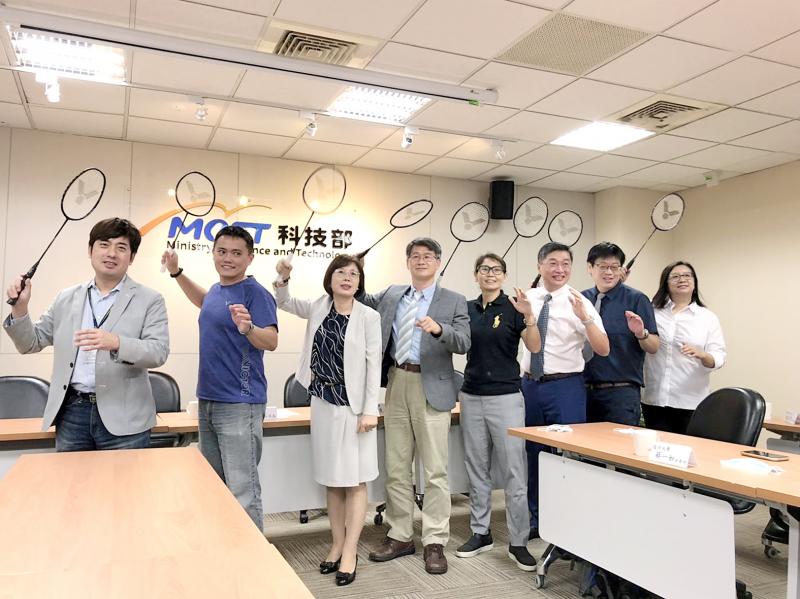A training system for badminton players utilizing artificial intelligence (AI) that was developed by university researchers and Victor Rackets Industrial Corp is being tested at a Tainan high school, researchers told a news conference at the Ministry of Science and Technology in Taipei yesterday.
Designed to give customized training to athletes, the system combines image recognition, racket motion trajectory, biosignal analysis and a cloud platform for data analysis, they said.
The system is comprised of a badminton racket with a built-in sensor for recording motion, a smart watch, a brainwave sensor and a camera attached to goggles to record biosignals, said Tsai Chia-liang (蔡佳良), director of National Cheng Kung University’s (NCKU) Institute of Physical Education.

Photo: CNA
The sensor in the racket initally weighed 9.5g, but Victor Rackets was able to optimize the design of the racket handle to keep the weight to within 6g, Tsai said.
The system has been tested by badminton players at National Hsin-Feng Senior High School in Tainan, home to badminton teams that have won several national competitions, he said.
The research team created an experimental field at the school equipped with cameras to capture players’ movements, said Wang Jeen-shing (王振興), a professor in NCKU’s department of electrical engineering.
Reading collected signals through machine learning and integrating all the functions to yield precise analyses were the main goals for developing the system, Wang said, adding that the researchers hope the system will be used by professional players.
To protect players’ personal data, each smart racket has an identification code, but Victor Rackets might later include encrypted information protection services for different levels of players, he added.
Hsin-Feng badminton coach Lee Yi-hsun (李宜勳) said the system allows her to better understand her players’ physical condition, and the students have been inspired by the devices to work harder to improve their performance.
Victor Taiwan marketing and sales division deputy director Elvis Ke (柯泓全) presented the high school with 45 smart rackets during the news conference.
The company’s main competitors in developing smart rackets are Chinese brands, but it is confident that it will gain the upper hand, Ke said.

A magnitude 6.4 earthquake struck off the coast of Hualien County in eastern Taiwan at 7pm yesterday, the Central Weather Administration (CWA) said. The epicenter of the temblor was at sea, about 69.9km south of Hualien County Hall, at a depth of 30.9km, it said. There were no immediate reports of damage resulting from the quake. The earthquake’s intensity, which gauges the actual effect of a temblor, was highest in Taitung County’s Changbin Township (長濱), where it measured 5 on Taiwan’s seven-tier intensity scale. The quake also measured an intensity of 4 in Hualien, Nantou, Chiayi, Yunlin, Changhua and Miaoli counties, as well as

Taiwan is to have nine extended holidays next year, led by a nine-day Lunar New Year break, the Cabinet announced yesterday. The nine-day Lunar New Year holiday next year matches the length of this year’s holiday, which featured six extended holidays. The increase in extended holidays is due to the Act on the Implementation of Commemorative and Festival Holidays (紀念日及節日實施條例), which was passed early last month with support from the opposition Chinese Nationalist Party (KMT) and Taiwan People’s Party. Under the new act, the day before Lunar New Year’s Eve is also a national holiday, and Labor Day would no longer be limited

COMMITMENTS: The company had a relatively low renewable ratio at 56 percent and did not have any goal to achieve 100 percent renewable energy, the report said Pegatron Corp ranked the lowest among five major final assembly suppliers in progressing toward Apple Inc’s commitment to be 100 percent carbon neutral by 2030, a Greenpeace East Asia report said yesterday. While Apple has set the goal of using 100 percent renewable energy across its entire business, supply chain and product lifecycle by 2030, carbon emissions from electronics manufacturing are rising globally due to increased energy consumption, it said. Given that carbon emissions from its supply chain accounted for more than half of its total emissions last year, Greenpeace East Asia evaluated the green transition performance of Apple’s five largest final

Taiwan is to extend its visa-waiver program for Philippine passport holders for another year, starting on Aug. 1, Minister of Foreign Affairs Lin Chia-lung (林佳龍) said on Friday. Lin made the announcement during a reception in Taipei marking the 127th anniversary of Philippine independence and the 50th anniversary of the establishment of the Manila Economic and Cultural Office (MECO) in Taiwan, the Ministry of Foreign Affairs said. The decision reflected Taiwan’s commitment to deepening exchanges with the Philippines, the statement cited Lin as saying, adding that it was a key partner under the New Southbound Policy launched in 2016. Lin also expressed hope